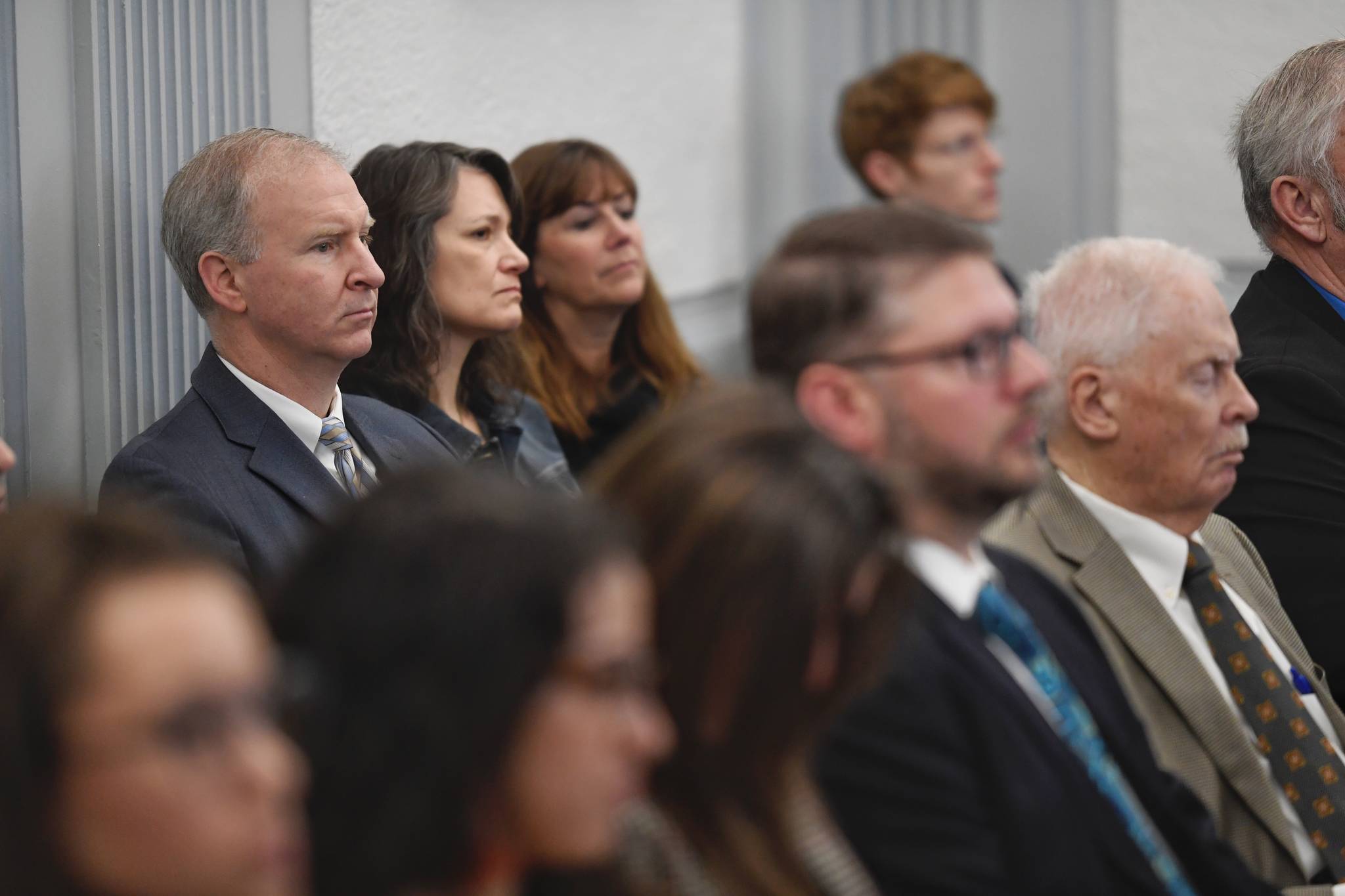Senators on both sides of the aisle packed a room in the Capitol Tuesday morning to hear more about the governor’s new proposal to cut $20 million from K-12 schools and $3 million from Village Public Safety Officer programs.
Office of Management and Budget Director Donna Arduin and Budget Director Lacey Sanders presented a line-by-line walk-through of the fiscal year 2019 supplemental budget released on Monday, during the Senate Finance Committee.
Arduin said the $20 million for schools, although approved through legislation in May 2018 as one-time funding, has not actually been distributed to schools, and isn’t scheduled to be delivered until early February.
But Sen. Click Bishop, R-Fairbanks, said that many school districts already have the money prioritized in their budgets for the 2018-2019 school year, so the proposed cuts would be challenging. He and other senators questioned whether there had been any discussions with school districts prior to Monday’s announcement.
“You should be talking to the school districts first,” Bishop told Arduin.
Sen. Peter Micciche, R-Soldotna, also asked if the governor’s office had asked school districts whether they’re being caught by surprise.
On Monday, Juneau School District Superintendent Bridget Weiss told the Empire in an interview that this would most definitely take them by surprise, as they approved their budget for the 2018-2019 school year last year with the expected revenue that was promised by the state as a part of this $20 million appropriation. Weiss was also in the crowd at the meeting on Tuesday.
Sen. Natasha von Imhof, R-Anchorage, the committee’s co-chair, said there are 17 agencies that have planned their budget accordingly for the fiscal year.
“This agency versus any of the other 16 agencies, if your budget is decreased in mid-year based on planning, the question I have is what makes education different from any other agency?” she said. “Or should we not do it to any agency? There are other agencies that also could be looked at.”
Arduin said that since the money had not yet been given out to the districts, they shouldn’t have planned to spend it.
“It is my contention that school districts and other entities seeking money or expecting money from the state should not be anticipating spending money that’s not been allocated to them,” she said.
This logic was essentially the opposite of what Gov. Dunleavy has used in his defense of the Permanent Fund Dividend, argued Sen. Lyman Hoffman, D-Bethel.
“SB 142 and HB 287 total supplements of $50 million ($20 million this year, $30 million next year), those two particular pieces of legislation are the law of the land,” Hoffman said. “I thought that the administration’s position was that once 9a bill became) the law, that’s what the administration wanted to follow. This was particularly pointed out by the governor when he talked about dividends, so what’s the difference between requirement of the law of the land on dividends and the laws of the land on (these bills)?”
Arduin responded that appropriations are the law of the land “until we request to change them.”
Village Public Safety Officer Program
Senate Democrats were unsatisfied with proposed cuts to the VPSO program.
During his State of the State address, Dunleavy declared a “war on criminals.” The proposed supplementary budget addresses this priority by offering increased funding to maintain and renovate trooper housing in rural Alaska and a 7.5 percent salary increase for Alaska State Trooper retention and recruitment efforts.
In opposition to this increase, his administration proposes cutting $3 million from VPSO programs.
“I find it not just hypocritical, but it’s even more concerning than that,” said Sen. Donald Olson, D-Golovin, in an interview with the Empire. “How can you (declare war on criminals) and then start pulling money from public safety?”
The same recruitment and retention issues that the governor addresses with increased funding also exist for the VPSOs, said Hoffman.
“Taking the money at this time (from the VPSO program) is short-sighted and does not do justice to the services that are required for the people in the far-flung corners of Alaska,” Hoffman said at the meeting. “We need to look at the intent of the programs and ask why these positions aren’t being filled. We need to ask those questions so that we are providing public safety for the troopers and the VPSOs equally and not creating two different classes of people in Alaska that need protection that is due them.”
Rep. David Talerico, R-Healy, said at a press conference Tuesday afternoon that several of the communities that he represents have VPSOs, but he would have to “look into” how the proposed $3 million cut would help solve the recruiting problem.
“I hope we have some serious discussions about what direction we think we should go to provide public safety there,” Talerico said. “We really do need to talk about how we provide a better service out there.”
He said the key thing right now regarding the supplementary budget is for the house to get organized, because they cannot do anything to address the bills until that happens.
Olson said a VPSO officer in his district already contacted him with concerns over the cut in funds. She was not available for comment for deadline.
“VPSOs are the first line of defense for tens of thousands of rural Alaskans,” Olson said in a press release Tuesday. “That money was appropriated last year to help recruit and retain highly qualified public safety officials, and I haven’t seen anything from this administration that has encouraged that desire. Pulling the rug out from underneath safe communities in rural Alaska is unacceptable. My constituents depend on these officers. I anticipate this is just the start of the broken promises of the Dunleavy Administration.”
• Contact reporter Mollie Barnes at mbarnes@juneauempire.com or 523-2228.

